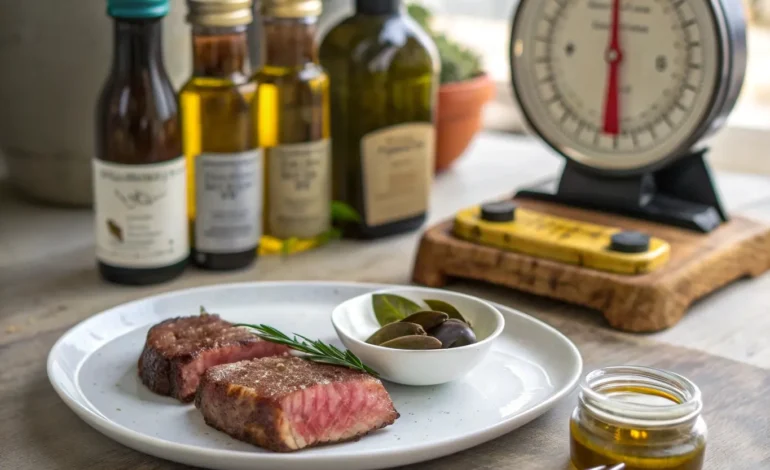Over the past few years, the debate around whether beef tallow healthier than oil has exploded across social media, wellness circles, and even mainstream nutrition discussions. Once a forgotten cooking fat, beef tallow is now making a comeback thanks to claims about its stability, nutrient profile, and even weight-loss benefits. But is it truly healthier or is the revival rooted more in nostalgia than science?
Let’s break down what beef tallow is, why it disappeared, and whether today’s claims hold up.
Beef tallow healthier than oil, simply rendered beef fat, was a kitchen staple for centuries. From frying, baking, and sautéing to skincare and candle-making, tallow’s stability made it invaluable. But in the mid-20th century, nutrition science and food politics shifted the public away from animal fats and toward vegetable and seed oils.
Today, many health influencers argue that seed oils are inflammatory, overly processed, and linked to chronic diseases. Meanwhile, traditional fats like tallow are promoted as more natural, stable, and nourishing.
The Ravoke reference article highlights that tallow’s return ties into ancestral eating, whole-food movements, and a desire for minimally processed ingredients. Competitor sources like Harvard Health, however, warn that high saturated fat intake may increase cardiovascular risk.
So where is the truth? Let’s explore it from all angles.
To determine whether beef tallow healthier than oil, you must look at nutrition, smoke point, inflammatory response, and impact on cardiovascular health.
Beef tallow has a smoke point of around 400°F, making it suitable for frying and high-heat cooking. Seed oils such as soybean or canola may oxidize at high temperatures, creating harmful byproducts.
Beef tallow is high in saturated fats (about 50%), while seed oils contain mostly polyunsaturated fats. Harvard’s competitor article warns that high saturated fat intake may raise LDL cholesterol, a key risk factor for heart disease. Unsaturated fats especially from olive oil are associated with improved heart health.
Beef tallow contains:
- Vitamins A, D, E, K
- Conjugated linoleic acid (CLA)
- Stearic acid (a saturated fat believed to have neutral cholesterol impact)
Seed oils generally provide omega-6 fatty acids. Excess omega-6 intake without balancing omega-3s may contribute to inflammation.
Beef tallow can be minimally processed.
Seed oils typically undergo:
- Chemical extraction
- High-heat refining
- Deodorization
- Bleaching
This contrast fuels the natural-fat movement.
For decades, public health messaging emphasized that saturated fats were dangerous. This belief—now more nuanced—caused many households to switch from tallow and butter to vegetable oils.
Today, newer studies suggest not all saturated fats act the same way in the body. Still, major institutions remain cautious, especially for people with existing heart risk.
Here are the required questions answered clearly and accurately.
In most cases, no—olive oil is considered healthier for everyday use. Olive oil contains heart-healthy monounsaturated fats, antioxidants, and anti-inflammatory compounds. It’s strongly supported by research as a core part of the Mediterranean diet, which reduces heart disease risk.
Beef tallow, while stable at high heat and less processed than many seed oils, is high in saturated fat. Occasional use is fine for many people, but olive oil remains the superior choice for heart health.
However, beef tallow can be suitable when:
- You’re cooking at very high heat
- You want a more natural, minimally processed fat
- You follow ancestral or low-carb eating patterns
Still, for cardiovascular protection, olive oil wins.
Beef tallow fell out of favor because:
- 1950s–1980s research linked saturated fat to heart disease
- Public health campaigns demonized animal fats
- Fast-food restaurants replaced tallow with cheaper, “healthier” seed oils
- Seed oil companies heavily marketed their products
- New industrial processing made oils cheaper and more accessible
Ironically, many of these seed oils (soybean, corn, canola) are now being scrutinized for high omega-6 content and heavy processing leading to tallow’s modern comeback.
Cardiologists generally advise caution with beef tallow.
Most heart specialists maintain that:
- High saturated fat intake can raise LDL cholesterol
- People with heart disease, diabetes, or high cholesterol should limit tallow
- Olive oil and avocado oil remain superior for heart health
- Occasional tallow use is acceptable, especially for high-heat cooking
Some cardiologists acknowledge that stearic acid (a major fat in tallow) is less harmful than other saturated fats, but still recommend moderation.
Supporters argue that traditional fats like tallow:
- Are less inflammatory
- Don’t oxidize easily
- Provide fat-soluble vitamins
- Align with how humans historically ate
These points are valid, but they do not override cardiovascular concerns for all individuals. Balance is essential.
Here’s a quick side-by-side:
| Feature | Beef Tallow | Olive Oil | Seed Oils (Soy/Corn/Canola) |
|---|---|---|---|
| Saturated Fat | High | Low | Very Low |
| Processing | Low | Low | High |
| Heart Health | Moderate risk | Strongly beneficial | Mixed |
| Cooking Stability | Very High | Moderate (low smoke point) | High |
| Nutrients | Vitamins A, D, K | Polyphenols | Omega-6 heavy |
This diversity explains why the debate continues.
Use tallow if you:
- Need a high-heat cooking fat
- Prefer traditional, minimally processed ingredients
- Follow paleo, keto, or carnivore diets
Use it in moderation if you:
- Have existing cholesterol issues
- Eat a Western diet high in processed foods
- Want long-term cardiovascular protection
A balanced kitchen may include:
- Olive oil for daily use
- Tallow for high-heat frying
- Butter or ghee for flavor
- Avocado oil for neutral taste
Balance is smarter than choosing extremes.
Kidney disease affects more than 35 million Americans, and 90% don’t know they have it. Here are the warning signs:
- Fatigue or weakness
- Swollen ankles or feet
- Foamy urine
- Frequent nighttime urination
- Blood in urine
- High blood pressure
- Loss of appetite
- Persistent itching
- Muscle cramps
- Shortness of breath
If you notice multiple symptoms, early testing is crucial kidney disease is most treatable in its early stages.
The question “is beef tallow healthier than oil?” does not have a one-size-fits-all answer. For high-heat cooking and minimal processing, tallow shines. For long-term heart health, olive oil still dominates. Seed oils remain controversial but widely used.
Also Read About: What Every Traveler Should Know About the Boat from Toronto to Niagara Falls

